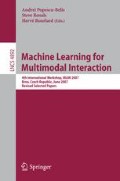Abstract
The PASCAL Speech Separation Challenge (SSC) is based on a corpus of sentences from the Wall Street Journal task read by two speakers simultaneously and captured with two circular eight-channel microphone arrays. This work describes our system for the recognition of such simultaneous speech. Our system has four principal components: A person tracker returns the locations of both active speakers, as well as segmentation information for each utterance, which are often of unequal length; two beamformers in generalized sidelobe canceller (GSC) configuration separate the simultaneous speech by setting their active weight vectors according to a minimum mutual information (MMI) criterion; a postfilter and binary mask operating on the outputs of the beamformers further enhance the separated speech; and finally an automatic speech recognition (ASR) engine based on a weighted finite-state transducer (WFST) returns the most likely word hypotheses for the separated streams. In addition to optimizing each of these components, we investigated the effect of the filter bank design used to perform subband analysis and synthesis during beamforming. On the SSC development data, our system achieved a word error rate of 39.6%.
Access this chapter
Tax calculation will be finalised at checkout
Purchases are for personal use only
Preview
Unable to display preview. Download preview PDF.
References
Gehrig, T., Klee, U., McDonough, J., Ikbal, S., Wölfel, M., Fügen, C.: Tracking and beamforming for multiple simultaneous speakers with probabilistic data association filters. In: Proc. Interspeech, pp. 2594–2597 (2006)
Bar-Shalom, Y., Fortmann, T.E.: Tracking and Data Association. Academic Press, San Diego (1988)
Van Trees, H.L.: Optimum Array Processing. Wiley-Interscience, Chichester (2002)
Hyvärinen, A., Oja, E.: Independent component analysis: Algorithms and applications. Neural Networks 13, 411–430 (2000)
McDonough, J., Kumatani, K.: Minimum mutual information beamforming. Technical Report 107, Interactive Systems Lab, Universität Karlsruhe (August 2006)
Kumatani, K., Gehrig, T., Mayer, U., Stoimenov, E., McDonough, J., Wölfel, M.: Adaptive beamforming with a minimum mutual information criterion. IEEE Trans. Audio Speech and Lang. Proc. (to appear)
Vaidyanathan, P.P.: Multirate Systems and Filter Banks. Prentice-Hall, Englewood Cliffs (1993)
de Haan, J.M., Grbic, N., Claesson, I., Nordholm, S.E.: Filter bank design for subband adaptive microphone arrays. IEEE Trans. Speech and Audio Proc. 11(1), 14–23 (2003)
Brehm, H., Stammler, W.: Description and generation of spherically invariant speech-model signals. Signal Processing 12, 119–141 (1987)
Mohri, M., Riley, M., Hindle, D., Ljolje, A., Periera, F.: Full expansion of context-dependent networks in large vocabulary speech recognition. In: Proc. ICASSP, Seattle, vol. II, pp. 665–668 (1998)
Mohri, M., Pereira, F., Riley, M.: Weighted finite-state transducers in speech recognition. Computer Speech and Language 16, 69–88 (2002)
Mohri, M., Riley, M.: Network optimizations for large vocabulary speech recognition. Speech Communication 25(3) (1998)
Stoimenov, E., McDonough, J.: Modeling polyphone context with weighted finite-state transducers. In: Proc. ICASSP (2006)
Stoimenov, E., McDonough, J.: Memory efficient modeling of polyphone context with weighted finite-state transducers. In: Proc. Interspeech (2007)
Mohri, M.: Finite-state transducers in language and speech processing. Computational Linguistics 23(2) (1997)
Mohri, M., Riley, M.: A weight pushing algorithm for large vocabulary speech recognition. In: Proc. ASRU, Aarlborg, Denmark, September 2001, pp. 1603–1606 (2001)
Mohri, M.: Minimization algorithms for sequential transducers. Theoretical Computer Science 234(1–2), 177–201 (2000)
Lincoln, M., McCowan, I., Vepa, J., Maganti, H.: The multi-channel wall street journal audio visual corpus (mc-wsj-av): specification and initial experiments. In: Proc. ASRU, pp. 357–362 (November 2005)
Wölfel, M., McDonough, J.: Minimum variance distortionless response spectral estimation, review and refinements. IEEE Signal Processing Magazine 22(5), 117–126 (2005)
Fukunaga, K.: Introduction to Statistical Pattern Recognition. Academic Press, New York (1990)
Gales, M.J.F.: Semi-tied covariance matrices. In: Proc. ICASSP (1998)
Fransen, J., Pye, D., Robinson, T., Woodland, P., Young, S.: Wsjcam0 corpus and recording description. Technical Report CUED/F-INFENG/TR.192, Cambridge University Engineering Department (CUED) Speech Group (September 1994)
Deller, J., Hansen, J., Proakis, J.: Discrete-Time Processing of Speech Signals. Macmillan Publishing, New York (1993)
Anastasakos, T., McDonough, J., Schwarz, R., Makhoul, J.: A compact model for speaker-adaptive training. In: Proc. ICSLP, pp. 1137–1140 (1996)
Uebel, L., Woodland, P.: Improvements in linear transform based speaker adaptation. In: Proc. ICASSP (2001)
Wölfel, M.: Mel-Frequenzanpassung der Minimum Varianz Distortionless Response Einhüllenden. In: Proc. of ESSV (2003)
Gales, M.J.F.: Maximum likelihood linear transformations for HMM-based speech recognition. Computer Speech and Language 12 (1998)
Leggetter, C.J., Woodland, P.C.: Maximum likelihood linear regression for speaker adaptation of continuous density hidden markov models. Computer Speech and Language 9, 171–185 (1995)
McDonough, J., Stoimenov, E., Klakow, D.: An algorithm for fast composition of weighted finite-state transducers. In: Proc. ASRU (submitted, 2007)
Simmer, K.U., Bitzer, J., Marro, C.: Post-filtering techniques. In: Branstein, M., Ward, D. (eds.) Microphone Arrays, pp. 39–60. Springer, Heidelberg (2001)
McCowan, I., Hari-Krishna, M., Gatica-Perez, D., Moore, D., Ba, S.: Speech acquisition in meetings with an audio-visual sensor array. In: Proceedings of the IEEE International Conference on Multimedia and Expo (ICME) (July 2005)
Author information
Authors and Affiliations
Editor information
Rights and permissions
Copyright information
© 2008 Springer-Verlag Berlin Heidelberg
About this paper
Cite this paper
McDonough, J. et al. (2008). To Separate Speech. In: Popescu-Belis, A., Renals, S., Bourlard, H. (eds) Machine Learning for Multimodal Interaction. MLMI 2007. Lecture Notes in Computer Science, vol 4892. Springer, Berlin, Heidelberg. https://doi.org/10.1007/978-3-540-78155-4_25
Download citation
DOI: https://doi.org/10.1007/978-3-540-78155-4_25
Publisher Name: Springer, Berlin, Heidelberg
Print ISBN: 978-3-540-78154-7
Online ISBN: 978-3-540-78155-4
eBook Packages: Computer ScienceComputer Science (R0)

